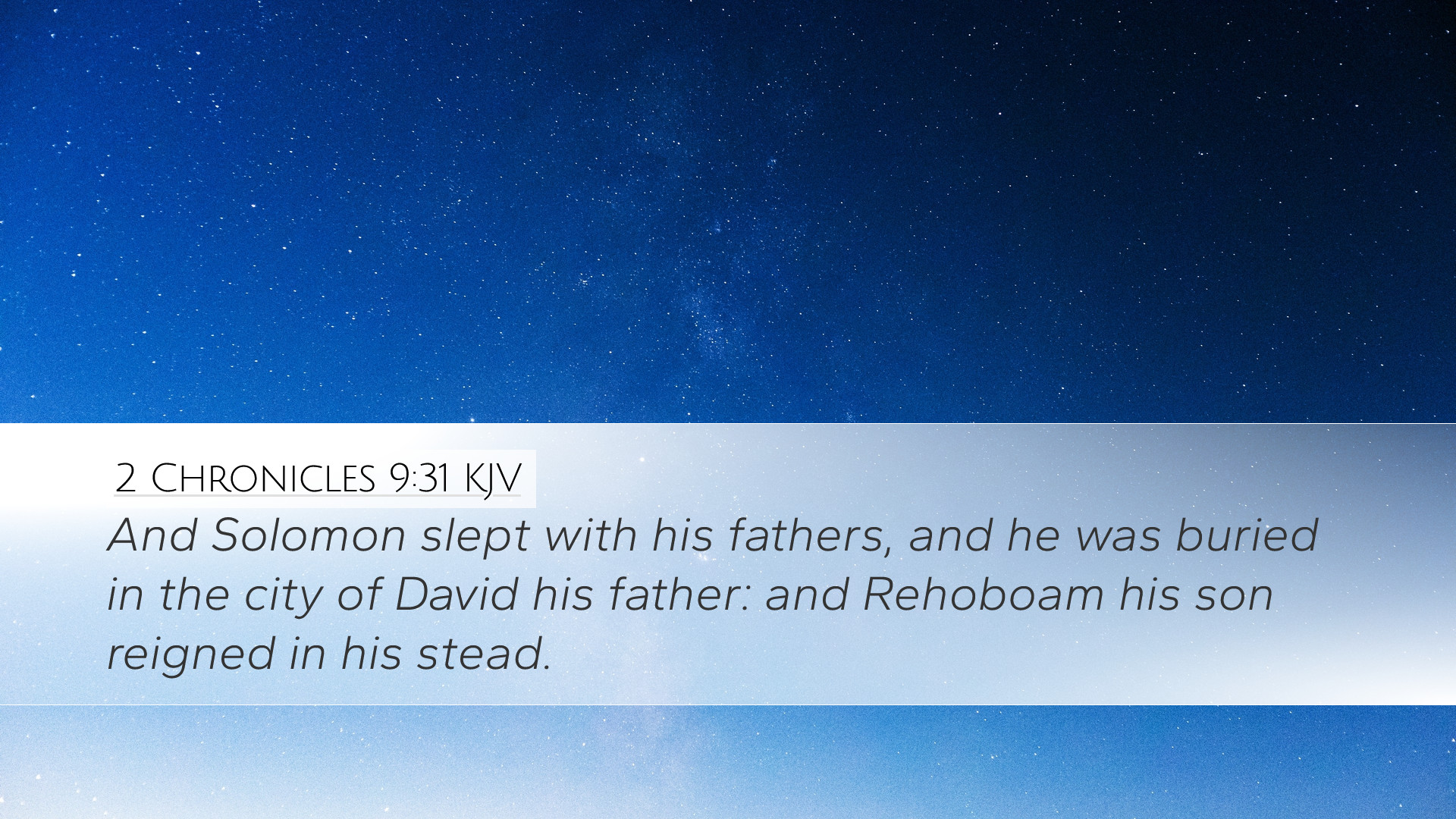Commentary on 2 Chronicles 9:31
2 Chronicles 9:31 references the death of King Solomon, a pivotal moment in biblical history. This verse reads: “And Solomon slept with his fathers, and he was buried in the city of David: and Rehoboam his son reigned in his stead.” This passage, though brief, encapsulates Solomon’s legacy and the transition of power to his son, Rehoboam, marking both an end and a beginning in Israel's monarchy.
Historical Context
The context of 2 Chronicles 9, and particularly verse 31, is crucial for understanding the reign of Solomon and its implications for the nation of Israel. Solomon, known for his unparalleled wisdom and wealth, built the magnificent temple in Jerusalem, solidifying the nation both spiritually and politically.
According to Matthew Henry, Solomon's death indicates the culmination of his reign, symbolizing both the accomplishments and the failures that characterized his leadership. As noted, his later years were marred by idolatry and the turning away from exclusive devotion to Yahweh, impacting the spiritual direction of Israel.
Reflections on Solomon's Reign
Reflecting on Solomon's achievements, Albert Barnes emphasizes the transition from glory to decline. Solomon's reign was marked by peace, prosperity, and monumental building projects, such as the Temple. However, Barnes warns that his pursuit of foreign alliances and indulgence in idol worship paved the way for Israel's future troubles. The mention of his burial “in the city of David” serves as a reminder of his royal status and the legacy he leaves behind.
Adam Clarke further explains that Solomon's wisdom did not prevent human frailty. He achieved great things through God-given wisdom but faltered due to his failure to remain faithful to covenantal obligations. Thus, Clarke highlights that while Solomon's external achievements were monumental, the spiritual decline during his reign eventually led to division in the kingdom after his death.
Theological Insights
The theological implications of 2 Chronicles 9:31 extend beyond historical narrative to offer rich insights into the nature of leadership, legacy, and the seriousness of covenant faithfulness. The text serves as a poignant reminder of the transient nature of earthly power.
- The Nature of Leadership: Leadership is a significant theme in this verse. Both Henry and Barnes elucidate that Solomon's wisdom did not exempt him from the consequences of sin. The weight of leadership carries not just the glory of achievement but also the burden of accountability before God.
- The Legacy of Solomon: Clarke points out that legacy consists of what leaders build for future generations. Solomon’s legacy was a mixed bag; while he built the Temple and established Israel's wealth, he also initiated a legacy of division through unfaithfulness, which Rehoboam inherited.
- The Shift of Power: The transition from Solomon to Rehoboam as noted in this verse symbolizes the unpredictability of dynastic succession. As Rehoboam takes the throne, the reader is left pondering the future, knowing the divided monarchy that is to come.
Lessons for Today’s Leaders
Considering the themes within 2 Chronicles 9:31, modern leaders—be they in the church, community, or larger governance—can glean essential wisdom:
- Importance of Spiritual Integrity: Leaders must maintain their spiritual integrity, as a deviation can have lasting repercussions on their communities.
- Awareness of Legacy: Every action undertaken by a leader has the potential to shape their legacy. Leaders ought to live with the awareness that their choices will be scrutinized by those who succeed them.
- Accountability and Humility: The story of Solomon illustrates the necessity of remaining humble and accountable before God. Great achievements can lead to complacency and a false sense of security.
Conclusion
In conclusion, 2 Chronicles 9:31 provides a concise but profound reflection on the life and legacy of Solomon. This verse is not merely a historical statement but serves as a theological and moral lesson for pastors, students, theologians, and Bible scholars. It articulates the importance of wisdom in leadership, the gravity of covenant fidelity, and the reminder of both the glory and the frailty of human ambition. As modern readers reflect upon Solomon's life, they are encouraged to consider the weight of their own leadership responsibilities and their influence on future generations.


